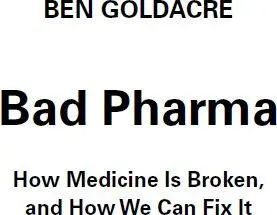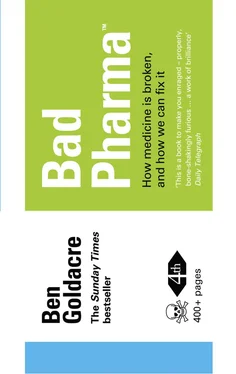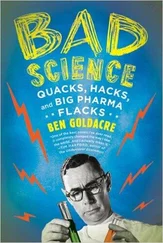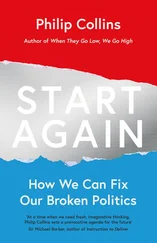

Fourth Estate
An imprint of HarperCollins Publishers
1 London Bridge Street
London SE1 9GF
www.4thestate.co.uk
First published in Great Britain by Fourth Estate in 2012
This revised and updated edition published by Fourth Estate in 2013
Copyright © Ben Goldacre 2012, 2013
The right of Ben Goldacre to be identified as the author of this work has been asserted by him in accordance with the Copyright, Design and Patents Act 1988
A catalogue record for this book is available from the British Library
All rights reserved under International and Pan-American Copyright Conventions. By payment of the required fees, you have been granted the non-exclusive, non-transferable right to access and read the text of this e-book on-screen. No part of this text may be reproduced, transmitted, down-loaded, decompiled, reverse engineered, or stored in or introduced into any information storage and retrieval system, in any form or by any means, whether electronic or mechanical, now known or hereinafter invented, without the express written permission of HarperCollins.
Source ISBN: 9780007498086
Ebook Edition © 2013 ISBN: 9780007363643
Version: 2015-01-20
To whom it may concern
CONTENTS
Cover
Title Page
Copyright Copyright Fourth Estate An imprint of HarperCollins Publishers 1 London Bridge Street London SE1 9GF www.4thestate.co.uk First published in Great Britain by Fourth Estate in 2012 This revised and updated edition published by Fourth Estate in 2013 Copyright © Ben Goldacre 2012, 2013 The right of Ben Goldacre to be identified as the author of this work has been asserted by him in accordance with the Copyright, Design and Patents Act 1988 A catalogue record for this book is available from the British Library All rights reserved under International and Pan-American Copyright Conventions. By payment of the required fees, you have been granted the non-exclusive, non-transferable right to access and read the text of this e-book on-screen. No part of this text may be reproduced, transmitted, down-loaded, decompiled, reverse engineered, or stored in or introduced into any information storage and retrieval system, in any form or by any means, whether electronic or mechanical, now known or hereinafter invented, without the express written permission of HarperCollins. Source ISBN: 9780007498086 Ebook Edition © 2013 ISBN: 9780007363643 Version: 2015-01-20
Dedication Dedication To whom it may concern
Intro
1. Missing Data
2. Where Do New Drugs Come From?
3. Bad Regulators
4. Bad Trials
5. Bigger, Simpler Trials
6. Marketing
Conclusion: Better Data
Afterword: What Happened Next?
Footnotes
Notes
Glossary
Acknowledgements, Further Reading and a Note on Errors
By the Same Author
About the Author
About the Publisher
Medicine is broken: the plane flies, but it crashes much more often than it needs to. And I genuinely believe that if patients and the public ever fully understand what has been done to them – what doctors, academics and regulators have permitted – they will be angry. On this, only you can judge.
We like to imagine that medicine is based on evidence, and the results of fair tests. In reality, those tests are often profoundly flawed. We like to imagine that doctors are familiar with the research literature, when in reality much of it is hidden from them by drug companies. We like to imagine that doctors are well-educated, when in reality much of their education is funded by industry. We like to imagine that regulators only let effective drugs onto the market, when in reality they approve hopeless drugs, with data on side effects casually withheld from doctors and patients.
I’m going to tell you how medicine works, just over the page, in one paragraph that will seem so absurd, so ludicrously appalling, that when you read it, you’ll probably assume I’m exaggerating. We’re going to see that the whole edifice of medicine is broken, because the evidence we use to make decisions is hopelessly and systematically distorted; and this is no small thing. Because in medicine, doctors and patients use abstract data to make decisions in the very real world of flesh and blood. If those decisions are misguided, they can result in death, and suffering, and pain.
This isn’t a simple story of cartoonish evil, and there will be no conspiracy theories. Drug companies are not withholding the secret to curing cancer, nor are they killing us all with vaccines. Those kinds of stories have, at best, a poetic truth: we all know, intuitively, from the fragments we’ve picked up, that something is wrong in medicine. But most of us, doctors included, don’t know exactly what.
These problems have been protected from public scrutiny because they’re too complex to capture in a soundbite, or even 3,000 words. This is why they’ve gone unfixed by politicians, at least to some extent; but it’s also why you’re holding a book of over four hundred pages. The people you should have been able to trust to fix these problems have failed you, and because you have to understand a problem properly in order to fix it yourself, this book contains all that you need to know.
So, to be clear, this whole book is about meticulously defending every assertion in the paragraph that follows.
Drugs are tested by the people who manufacture them, in poorly designed trials, on hopelessly small numbers of weird, unrepresentative patients, and analysed using techniques which are flawed by design, in such a way that they exaggerate the benefits of treatments. Unsurprisingly, these trials tend to produce results that favour the manufacturer. When trials throw up results that companies don’t like, they are perfectly entitled to hide them from doctors and patients, so we only ever see a distorted picture of any drug’s true effects. Regulators see most of the trial data, but only from early on in a drug’s life, and even then they don’t give this data to doctors or patients, or even to other parts of government. This distorted evidence is then communicated and applied in a distorted fashion. In their forty years of practice after leaving medical school, doctors hear about what works through ad hoc oral traditions, from sales reps, colleagues or journals. But those colleagues can be in the pay of drug companies – often undisclosed – and the journals are too. And so are the patient groups. And finally, academic papers, which everyone thinks of as objective, are often covertly planned and written by people who work directly for the companies, without disclosure. Sometimes whole academic journals are even owned outright by one drug company. Aside from all this, for several of the most important and enduring problems in medicine, we have no idea what the best treatment is, because it’s not in anyone’s financial interest to conduct any trials at all. These are ongoing problems, and although people have claimed to fix many of them, for the most part they have failed; so all these problems persist, but worse than ever, because now people can pretend that everything is fine after all.
That’s a lot to stand up, and the details are much more horrific than that paragraph makes it sound. There are some individual stories that will make you seriously question the integrity of the individuals involved; some that will make you angry; and some, I suspect, that might make you very sad. But I hope you will come to see that this is not just a book about bad people. In fact, it’s possible for good people, in perversely designed systems, to casually perpetrate acts of great harm on strangers, sometimes without ever realising it. The current regulations – for companies, doctors and researchers – create perverse incentives; and we’ll have better luck fixing those broken systems than we will ever have trying to rid the world of avarice.
Читать дальше














